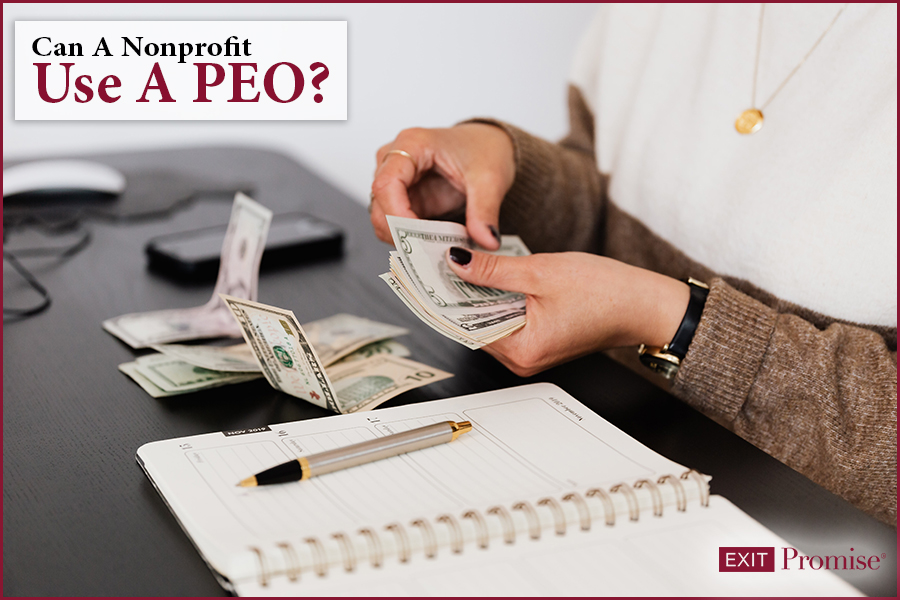- Maximizing After Tax Proceeds When Selling Your Business - June 7, 2024
- Understanding the Accredited Investor Rule 501 of Regulation D - February 27, 2024
- Which is Best – Business Broker, M&A Advisor, or an Investment Banker? - October 2, 2023

Have a Question?
Ask your Question below!
One of our investors or advisors will answer.
In our PEO series, we’ve talked about what a PEO company is and who is the employer in a PEO relationship. Here, we’ll discuss PEO for nonprofits, and whether or not using a PEO for your nonprofit might make sense.
PEO for Nonprofits
As it turns out, nonprofits have unique employment issues that PEOs can address well. By definition, a nonprofit doesn’t typically have extra funds to serve as a cushion in tough times. All profit is used to maintain operations, and very few nonprofits have the profit margin to employ a Human Resources professional, let alone a well-staffed department.
Enter the Professional Employer Organization (PEO). PEOs are designed to eliminate many of the challenges that businesses face when it comes to the management of personnel issues – and can be especially beneficial to a nonprofit who is already strapped for cash and resources.
Nonprofit Human Resource Challenges
Nonprofits face several challenges when it comes to managing their human resources tasks. These challenges include:
- staying compliant with ever-changing laws, regulations, and statutes at local, state and federal levels; and
- competition for attracting and keeping good talent; and
- resources for negotiating with, selecting, and maintaining relationships with vendors and partners.
Because nonprofits are already strapped for resources, an oversight on any aspect of HR could mean diverting even more time and energy away from the mission to resolve errors and pay fines for noncompliance. In addition, nonprofits without an HR department may struggle to obtain competitive and affordable benefits packages for its employees.
PEO Solutions for Nonprofits
Because a PEO eliminates the need for a Human Resource department, the nonprofit can focus valuable resources on their mission. The PEO also relieves leadership – including the executive leadership and the Board of Directors – of the burdens and responsibilities associated with managing legal and compliance issues related to personnel.
Additionally, the PEO handles all payroll, recordkeeping, and tax-related tasks, which allows nonprofit employees and volunteers to dedicate themselves to the mission of the nonprofit.
The Co-Employment Relationship
As the PEO takes on all tasks related to payroll, compliance, tax payments, risk management, unemployment claims, worker’s compensation, and employee insurance and benefits, the non-profit will be required to accept the PEO’s guidelines for policies and procedures. Though this sometimes can result in a loss of control over some aspects of the nonprofit’s culture, the benefits typically outweigh the cost.
PEOs can also offer additional benefits such as assistance with recruiting, background screening, and training. Other perks include deals on group insurance premiums, 401(K) plan participation, and employee assistance programs – benefits that help to attract and keep good talent.
Other Considerations
Nonprofits are required to comply with certain state and federal laws – including taxation withholding, reporting obligations, and payment of wages. As such, it is important to address those nuances as you search for the right PEO for your organization. To ensure compliance, we recommend involving a CPA in the transition of accounting and tax records.
For many nonprofits, hiring a PEO can prove to be a mutually beneficial relationship. PEOs offer nonprofits’ executives, managers and their employees more than a few benefits, and free up valuable resources so they may accomplish the mission at hand.













Will using a PEO impact our employees’ eligibility for the federal public interest loan forgiveness program?
Hi Chris,
As long as the organization you are working for is qualified, the business paying you (the PEO) is disregarded.
You will need to properly document the arrangement between the entity you work for and the PEO when applying for forgiveness.
This FAQs page may be helpful to you Chris.
All the best…
do nonprofits lose some tax advantages when they use a PEO?
Hi Nancy,
If your non-profit chooses to handle payroll and benefits through a PEO, the tax deductions for payroll and benefits expenses will not change.
All the best…
what reports do PEO’s give a non-profit to use for personnel reports to the federal government
Hi Nancy,
I assume you are asking this question in the context of applying for the PPP Loan Round 2…
Because PEOs file a single set of tax reports for all of its clients, it’s not possible for a business under a PEO arrangement to provide these reports to their SBA Lender.
The SBA has instructed the lenders to accept reports generated from the PEO showing gross pay amounts for employees, state unemployment taxes paid and healthcare insurance premiums paid by the business.
The PEO should be able to generate these reports or direct you to where you may do so from their portal.
I’ve had clients who tell me their lender said they wouldn’t accept the reports. They are dead wrong. Push back. The SBA’s regulations spell out how to handle this situation. Point your lender to question number 10 in the SBA document.
All the best Nancy!